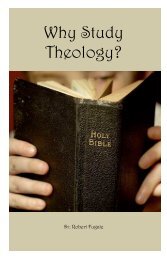"Has God Indeed Said?" - Biblical Blueprints
"Has God Indeed Said?" - Biblical Blueprints
"Has God Indeed Said?" - Biblical Blueprints
You also want an ePaper? Increase the reach of your titles
YUMPU automatically turns print PDFs into web optimized ePapers that Google loves.
22 • <strong>Has</strong> <strong>God</strong> <strong>Indeed</strong> <strong>Said</strong>?<br />
11. Caution with Internal Evidence Assumptions<br />
Internal evidence should be used with extreme care in<br />
determining the text (1Cor. 2:11; Jer. 17:9-10).<br />
Internal evidences are guesses as to what motive a scribe had<br />
to change the text. For example, the first rule of internal<br />
evidence states that the "shorter reading is to be preferred"<br />
because it was assumed that scribes tended to add material rather<br />
than omit material. 31 The second rule states that "the harder<br />
reading is to be preferred" because it was assumed that scribes<br />
would try to simplify the text and/or resolve apparent<br />
contradictions or theological problems by changing the text.<br />
These and other rules of internal evidence are pure assumptions.<br />
While these rules of internal evidence give the illusion of being a<br />
scientific method, the reality is that motives are hard to read, and<br />
the best textual critics come to widely ranging conclusions. The<br />
use of internal evidence has made textual criticism extremely<br />
subjective. Scripture is clear, "For what man knows the things of<br />
a man except the spirit of the man which is in him?" (1Cor.<br />
2:11). Jeremiah 17:9-10 indicates that no man can fully<br />
understand the motives of the heart.<br />
Furthermore, the subjective opinions of these five liberal<br />
scholars are frequently driven by theological bias, yet the NIV<br />
and NASB have accepted their readings anyway. For example, in<br />
the Majority Text, John 3:13 reads: "And no one has ascended<br />
into heaven except the One who descended from heaven, even<br />
the Son of Man who is in heaven." The last phrase, "who is in<br />
heaven" speaks of Christ’s omnipresence while on earth. All<br />
modern versions leave that out even though the liberal<br />
committee was divided two to three. Only twelve manuscripts<br />
leave it out. Most retain it. Almost all early church fathers quote<br />
the phrase as genuine.<br />
31 Actually, A.C. Clarke, professor of Latin at Cambridge, demonstrated that<br />
with the Latin classics, scribes were much more prone to accidentally omit<br />
something than to add. (See Pickering, p. 80.)






